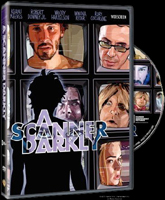 BUY ME AT AMAZON: CLICK HERE!
BUY ME AT AMAZON: CLICK HERE!
STUDIO: Warner Independent
MSRP: $27.98
RATED: R
RUNNING TIME: 100 min.
SPECIAL FEATURES:
• Commentary by Keanu Reeves, Richard Linklater, Tommy Pallotta, Jonathan Lethen, and Isa Dick Hackett
• One Summer In Austin: The Story of Filming A Scanner Darkly
• The Weight of the Line: Animation Tales
The Pitch
I’m not paranoid. You’re paranoid.
The Humans
Keanu Reeves (Feeling Minnesota), Robert Downey, Jr (Back to School), Woody Harrelson (Money Train), Winona Ryder (Great Balls of Fire), Rory Cochrane (Slacker)
The Nutshell
It is the very near future. There is a War on Drugs and it’s not going well. The brain-destroying Substance D is everywhere, its manufacture and distribution shrouded in mystery. The police depend almost entirely upon the surveillance and infiltration of the user subculture to make their busts. No one is who they seem; worse, no one is who they want to be.
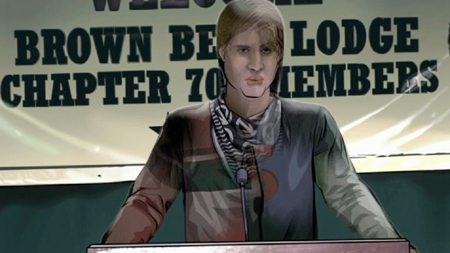
"I think you’ll all be relieved to learn that as of today,
Colorblind Carl has been relieved of laundry duty."
Appropriately, we first encounter our hero (Reeves) in an unidentifiable state. He’s an undercover narcotics agent: when not in the field he answers to the code-name Fred and wears a ‘scramble suit’ that perpetually obscures and rearranges his voice and physical appearance. In the field? His name is Bob Arctor… and he really is an addict, estranged from his family and sharing his derelict house with fellow users Barris (Downey), Luckman (Harrelson), and sometime girlfriend Donna (Ryder).
One day, Fred is assigned to spy on Bob. Nobody else knows they’re the same person. The increasing neural damage wrought by Substance D makes it harder and harder for him to tell where Bob ends and Fred begins.
The Lowdown
Philip K. Dick (1928-1982) wrote A Scanner Darkly towards the end of his life. It’s not by any means the last thing he wrote—he was astonishingly prolific– but possibly more than any of his other works it speaks as a self-portrait. It is an elegy for friends lost to drug addiction, reported by a fellow casualty.

It seems natural to place Dick in the pantheon of great science fiction authors. But try it, and in a couple of hours you’ll find him off in a dark corner, typing away, having alienated the dreamers and fantasists. His true place is a no-man’s-land between the Beats and the Gonzos: you can hear it in his dissatisfaction with the postwar middle-class experience, his obsessive cataloging of pop-culture influences, his clinical awareness of his own impairment.
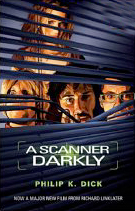 BUY THE BOOK AT AMAZON: CLICK HERE!
BUY THE BOOK AT AMAZON: CLICK HERE!
PUBLISHER: Vintage Books
MSRP: $12.95
PAGES: 278
Read it out loud. Listen to how the characters talk, both to each other and to themselves as Dick free-associates from curbside observation to paranoid fantasy and back again.
It’s appropriate that Richard Linklater (Slackers, Before Sunrise) has tackled the film adaptation. His best movies have always been based in speech, in stream-of-consciousness monologues or dialogues. A Scanner Darkly may be the first filmic translation of Philip K. Dick that can stand proudly alongside the original, and it’s because of the words.
Some characters have been combined and some of the narrative shuffled around, but the spirit is true from the very first image: a man with imaginary aphids crawling all over his body. The movie is rendered entirely in rotoscoped animation, which creates the effect of viewing the story through an altered consciousness, a perspective that keeps us engrossed when there’s nothing particularly spectacular going on. More importantly, Linklater and his cast have retained the humor to be found in Dick’s writing: scenes in which the junkies spin ever-wilder theories between each other have a properly absurd logic to them.
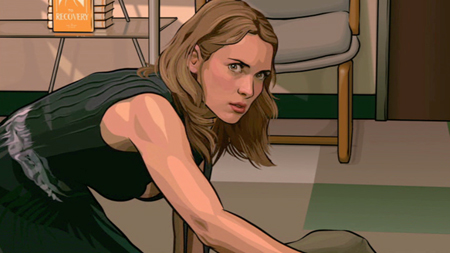
Won’t ya come back, green Ryder?
As Arctor, Reeves is ideal, his natural blankness masking a portrayal of a man who knows he’s losing his mind but has no idea how much is already gone. Ryder’s Donna is an improvement over the book—Dick never did give much thought to his female characters, but what is done here seems to fit his outlook while making her more human. Harrelson and Downey portray heavy drug users with great authenticity.
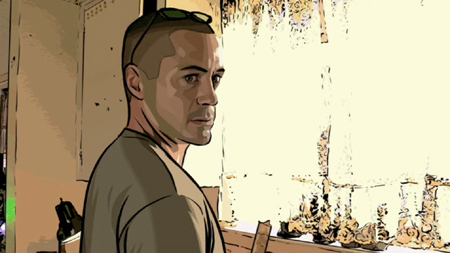
"Kilmer wasn’t kidding about that talking monkey."
I don’t mean for that last statement to sound like a cheap shot: just in case anyone hasn’t noticed, Robert Downey Jr has been bringing us solid gold for the last couple of years. I can’t imagine anyone better suited for the role of Barris. Easily the smartest character in the group, he’s still not as smart as he thinks he is, making him doubly dangerous. The film’s take on him is slightly harsher than in the book; I miss the one scene, following the ‘home-made silencer’ episode, where he confides to Arctor that he doesn’t always know what he’s doing, or who he is when he’s doing it.
 I’d also like to mention the music, mainly so I can plug
I’d also like to mention the music, mainly so I can plug
THE SOUNDTRACK CD
BUY IT AT AMAZON: CLICK HERE!
LABEL: Lakeshore Records
MSRP: $18.98
TRACKS: 22
… but if you’re a Radiohead fan you should know going in that there’s none of that stuff here. Personally, I think their songs are what really give the film its sonic identity.
The Package
Man, I love me a direct-digital transfer. Judging by the leap in quality from Linklater’s previous animated venture, Waking Life, the potential exists for a Rotoscope Revolution in the next five years. I think it’s a lovely way to watch movies, and a brilliant method of suspending disbelief in an age when we’re used to assuming that anything onscreen can be faked. There are some rough spots: it’s apparent (particularly in the bicycle scene) that many of the animators had to learn on the job. Winona Ryder’s likeness seems to have been especially difficult to capture consistently.
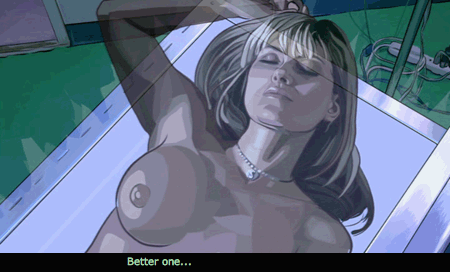
We get two mini-documentaries, covering the two basic phases of production: the live-action shoot with the actors, and the painstaking animation process. The commentary track focuses on Dick’s personal history (thanks largely to the participation of his two daughters) but doesn’t go into the more colorful details of production, like the fact that the original animation director walked off the project halfway through.
Can I rant a bit here about the Academy Awards’ Best Animated Feature category? I don’t get how this film wasn’t even nominated—the artistry on display is as accomplished as it is experimental. Sure, for the longest time the best an animated film could expect was a statuette for Best Song, but Beauty and the Beast was angling to change all that when it made it to the final five for Best Picture in 1991. With this new category in place, something like that will never happen again, but why don’t they be honest and just change the name of the award to Best Kids’ Movie?

"I am, I am Ferdinand, and I know what’s happening."